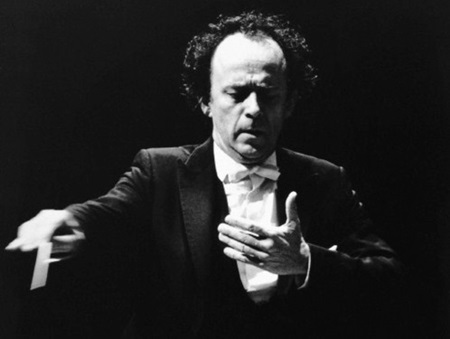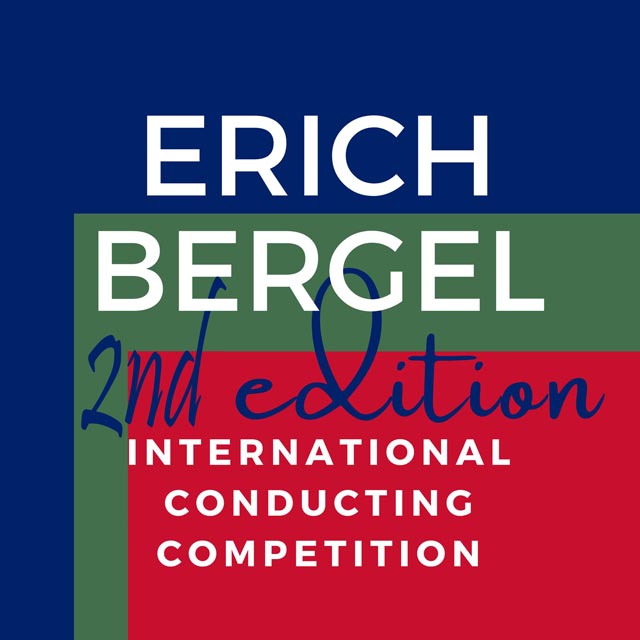ERICH BERGEL
INTERNATIONAL CONDUCTING COMPETITION
ERICH BERGEL
The formation of the young Erich Bergel’s music-centered personality was followed by the gradually dying notes of the century-old Saxon culture of Southern Transylvania. He realized early on that he would need unwavering diligence and self-discipline paired with humility in order to access the craft and know-how of the greats of musical history, to experience the suggestive force radiating from their ideas.
All through this and all his life he was led by the desire that, eventually, leading an orchestra, he could authentically project and become a medium for the profoundest messages of great compositions to serve his public. At the Cluj conservatory, an ideal teacher-student relationship is formed between him and Antonin Ciolan (whom Celibidache called “the patriarch of the baton”) and who trained him to become his successor leading the orchestra brought by him to a very high standard – but the wishes of his beloved master couldn’t be fulfilled, due to an anonymous accusation and a short political trial ending in a prison sentence. In the court practices of the 1950s-60s, it wasn’t the prosecution that had to prove the (in the present case, preposterous) crime, but it was up to the prosecuted to prove their innocence – a completely hopeless situation under an oppressive system.
Years of humiliation followed, even after his release from prison; a long time had to pass before Erich Bergel could hold a baton again at last – and it was the incontestable merit of the then management of the Târgu Mureș Philharmonic that his name could appear on a poster again. However, the restrictions hadn’t stopped, and he was left to make the difficult decision of leaving his homeland.
After a seemingly endless period of applications, he became free of the stranglehold of the communist state at last and his exceptional carreer could begin. Here I am going to list a few of the world famous orchestras directed by him, with the pride one feels at their mention, due to their bearing the traces of the hand movements of a great Transylvanian contemporary artist: Royal Philharmonic Orchestra London, Liverpool Philharmonic Orchestra, Bornemouth Symphony Orchestra, Royal Stokholm Philharmonic Orchestra, Helsinki Philharmonic Orchestra, Wiener Symphoniker, Symphonieorchester des Bayerischen Rundfunks München, Berliner Philharmoniker, Orchestra dell’Accademia Santa Cecilia Roma, Orchestre de Paris, Orchester Zürich, Orquestra Ciutat de Barcelona, Orchestra Sinfónica de RTVE Madrid, Istambul Orchestra Symphonica, Israel Philarmonic Orchestra, Haifa Symphony Orchestra, New Zealand Symphony Orchestra, Chicago Symphony Orchestra, San Francisco Symphony Orchestra, Cleveland Symphony Orchestra, Houston Symphony, New Orleans Symphony Orchestra, Toronto Symphony Orchestra, Tokyo Symphony Orchestra, Budapest National Philharmonic Orchestra, Budapest Philharmonic Society Orchestra, Cape Town Symphony Orchestra, Orchestre Philharmonique de Monte-Carlo, nearly every orchestra in Romania, both metropolitan and provincial.
He fulfilled the permanent conductor’s position in Cluj and for a short period in Târgu Mureș (during which he udertook a longer Mozart series as well), and he conducted our orchestra in the Fortress Church in his penultimate concert. His frequent performances in our town and his close relationship with our institution provides ample foundation for the organization of a conductor competition in Târgu Mureș named after him.
Boldizsár Csíky

ERICH BERGEL
The formation of the young Erich Bergel’s music-centered personality was followed by the gradually dying notes of the century-old Saxon culture of Southern Transylvania. He realized early on that he would need unwavering diligence and self-discipline paired with humility in order to access the craft and know-how of the greats of musical history, to experience the suggestive force radiating from their ideas.
All through this and all his life he was led by the desire that, eventually, leading an orchestra, he could authentically project and become a medium for the profoundest messages of great compositions to serve his public. At the Cluj conservatory, an ideal teacher-student relationship is formed between him and Antonin Ciolan (whom Celibidache called “the patriarch of the baton”) and who trained him to become his successor leading the orchestra brought by him to a very high standard – but the wishes of his beloved master couldn’t be fulfilled, due to an anonymous accusation and a short political trial ending in a prison sentence. In the court practices of the 1950s-60s, it wasn’t the prosecution that had to prove the (in the present case, preposterous) crime, but it was up to the prosecuted to prove their innocence – a completely hopeless situation under an oppressive system.
Years of humiliation followed, even after his release from prison; a long time had to pass before Erich Bergel could hold a baton again at last – and it was the incontestable merit of the then management of the Târgu Mureș Philharmonic that his name could appear on a poster again. However, the restrictions hadn’t stopped, and he was left to make the difficult decision of leaving his homeland.
After a seemingly endless period of applications, he became free of the stranglehold of the communist state at last and his exceptional carreer could begin. Here I am going to list a few of the world famous orchestras directed by him, with the pride one feels at their mention, due to their bearing the traces of the hand movements of a great Transylvanian contemporary artist: Royal Philharmonic Orchestra London, Liverpool Philharmonic Orchestra, Bornemouth Symphony Orchestra, Royal Stokholm Philharmonic Orchestra, Helsinki Philharmonic Orchestra, Wiener Symphoniker, Symphonieorchester des Bayerischen Rundfunks München, Berliner Philharmoniker, Orchestra dell’Accademia Santa Cecilia Roma, Orchestre de Paris, Orchester Zürich, Orquestra Ciutat de Barcelona, Orchestra Sinfónica de RTVE Madrid, Istambul Orchestra Symphonica, Israel Philarmonic Orchestra, Haifa Symphony Orchestra, New Zealand Symphony Orchestra, Chicago Symphony Orchestra, San Francisco Symphony Orchestra, Cleveland Symphony Orchestra, Houston Symphony, New Orleans Symphony Orchestra, Toronto Symphony Orchestra, Tokyo Symphony Orchestra, Budapest National Philharmonic Orchestra, Budapest Philharmonic Society Orchestra, Cape Town Symphony Orchestra, Orchestre Philharmonique de Monte-Carlo, nearly every orchestra in Romania, both metropolitan and provincial.
He fulfilled the permanent conductor’s position in Cluj and for a short period in Târgu Mureș (during which he udertook a longer Mozart series as well), and he conducted our orchestra in the Fortress Church in his penultimate concert. His frequent performances in our town and his close relationship with our institution provides ample foundation for the organization of a conductor competition in Târgu Mureș named after him.
Boldizsár Csíky

REGISTER NOW
ADDRESS
Tîrgu Mureș’ Palace of Culture, Piața Victoriei nr.1

DATES
October 15th 2023: starts the registration period
March the 1st 2024: end of the registration period
–
April the 8th: start of the Final Phase
April the 12th: Final Concert and Award Ceremony

